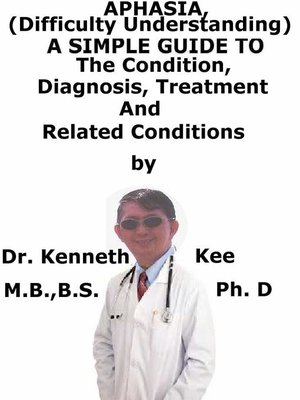Aphasia, (Difficulty Understanding) a Simple Guide to the Condition, Diagnosis, Treatment and Related Conditions
ebook
By Kenneth Kee

Sign up to save your library
With an OverDrive account, you can save your favorite libraries for at-a-glance information about availability. Find out more about OverDrive accounts.
Find this title in Libby, the library reading app by OverDrive.



Search for a digital library with this title
Title found at these libraries:
| Loading... |
Aphasia is a medical neurological disorder caused by injury to the parts of the brain that are accountable for language production or processing.For most people, these regions are on the left side of the brain.It may happen suddenly or progressively dependent on the form and site of brain tissue affected.Aphasia normally happens suddenly, often after a stroke or head injury, but it may also form slowly, as the effect of a brain tumor or a progressive neurological disease.The disorder reduces the expression and understanding of language as well as reading and writing.Aphasia may co-exist with speech disorders, such as dysarthria or apraxia of speech, which also occur from brain injury.Primary features of the disorder are:1. Difficulty in articulating oneself when speaking,2. Difficulty comprehending speech, and3. Difficulty with reading and writing.Aphasia is not a sickness but a symptom of brain injury.Even though it is mainly seen in patients who have suffered a stroke, aphasia can also occur from a brain tumor, infection, inflammation, head injury or dementia that involve language-linked regions of the brain.The form and seriousness of language dysfunction is dependent on the exact site and spread of the injured brain tissue.Aphasia is a problem with communication.Normally, aphasia can be categorized into four broad groups:1. Expressive aphasia (also called Broca's aphasia) affects difficulty in passing on thoughts through speech or writing.The person knows what she/he wants to say, but cannot find the words he needs.2. Receptive aphasia (Wernicke's aphasia) affects difficulty comprehending spoken or written language.The patient hears the voice or sees the print but cannot make sense of the words.3. Global aphasia results from severe and extensive damage to the language areas of the brain.People lose almost all language function, both comprehension and expression.They cannot speak or understand speech, nor can they read or write.4. Patients with anomic or amnesia aphasia, the least serious form of aphasia, have difficulty in using the correct names for special objects, people, places, or events.There are many different types of aphasia; no two people have the same experience.The doctor also normally tests the person's capability to comprehend and produce language, such as following commands, answering questions, naming objects, and carrying on a conversationMost patients will go through a magnetic resonance imaging (MRI) or computed tomography (CT) scan to find out the presence of a brain injury and to recognize its exact site.Speech-language treatment is used to help patients reclaim their ability to communicate.Aphasia treatment focuses to get better a person's capability to communicate by assisting him or her to use residual language abilities, recover language abilities as much as possible, and learn other ways of communicating, such as gestures, pictures, or use of electronic devices.Medical treatment of aphasia is regarded experimental; dopaminergic, cholinergic, and stimulant drugs have been tried, but no clear advantage has been proven in large trialsSSRI antidepressants have been revealed to assist the emotional and behavioral problems.Some trials suggest advantage from transcranial magnetic stimulation in patients with aphasia.TABLE OF CONTENTIntroductionChapter 1 AphasiaChapter 2 CausesChapter 3 SymptomsChapter 4 DiagnosisChapter 5 TreatmentChapter 6 PrognosisChapter 7 StrokeChapter 8 DyslexiaEpilogue






